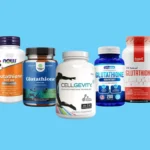As the demand for glutathione grows in the field of health and well-being, it is essential to bring attention to the less recognized adverse effects and potential risks linked to its utilization. While glutathione is celebrated for its potential benefits, it’s essential to have a comprehensive understanding of the potential dark side.
Glutathione, an inherent potent antioxidant within the body, assumes a crucial function in preserving general health and well-being [1]. “Glutathione Side Effects: for Supplements and IV Therapy.” In this article, we will delve into the world of glutathione, an essential antioxidant that plays a crucial role in maintaining our health and well-being. Glutathione has gained popularity in recent years through supplements and intravenous (IV) therapy, as people recognize its potential benefits. Nonetheless, gaining a holistic comprehension of glutathione, its impacts, and the various administration approaches is crucial for making well-informed choices regarding its utilization.
Glutathione stands as a remarkably significant compound, produced naturally within our organisms. Its role entails acting as an antioxidant, safeguarding our cells against harm induced by free radicals and oxidative stress. Antioxidants are vital in the prevention of chronic illnesses, including cancer, and in supporting overall cellular well-being [1]. Glutathione has attracted considerable interest for its potential advantages in diverse health conditions, as well as its capacity to improve the immune system, mood, memory, and blood sugar control.
Its ability to neutralize free radicals and protect against oxidative stress has led to its widespread use as a dietary supplement and in intravenous therapy [2]. However, it is important to note that like any other substance, glutathione is not without its potential side effects and risks. In this article, we will also delve into the lesser-known side effects and risks associated with glutathione, providing you with valuable information to make informed decisions about its use.
What is Glutathione?
Glutathione is a tripeptide composed of three amino acids: cysteine, glycine, and glutamic acid. It is present in every cell of our body and acts as a powerful antioxidant. Its primary function is to neutralize free radicals, harmful substances that can damage our cells and DNA [3]. By doing so, glutathione protects our cells from oxidative stress, which can lead to chronic diseases such as cancer, cardiovascular disease, and neurodegenerative disorders.
Moreover, glutathione plays a crucial role in supporting our immune system, aiding in detoxification processes, and maintaining optimal cellular function. It is involved in DNA synthesis and repair, protein synthesis, and regulation of cellular processes [1]. Its multifaceted benefits make glutathione a sought-after molecule for supplementation and therapy.
Glutathione Supplements vs. IV Therapy

Glutathione supplements come in various forms, including oral capsules, tablets, and sublingual sprays. While these supplements offer convenience, their absorption through the digestive system is often limited. On the other hand, glutathione IV therapy has gained popularity due to its ability to deliver the antioxidant directly into the bloodstream, bypassing the digestive process.
IV therapy involves the administration of glutathione through an intravenous drip, allowing for higher absorption rates and faster availability to the cells. This method ensures that the glutathione reaches its target tissues more effectively [3]. IV therapy has shown promising results in enhancing antioxidant levels, supporting detoxification, and providing a wide range of cellular benefits.
Cellular Benefits of Glutathione
Glutathione supplementation offers a myriad of cellular benefits that positively impact our overall health and well-being. By neutralizing free radicals and reducing oxidative stress, glutathione helps protect against cancer, slow down the aging process, and reduce inflammation [1]. Additionally, glutathione supports immune function, promoting a robust defense against pathogens and reducing the risk of infections.
Research suggests that glutathione plays a role in mood regulation, memory enhancement, and blood sugar regulation [1]. These findings highlight the far-reaching effects of glutathione on various aspects of our physical and mental well-being.
Specific Health Conditions and Glutathione
Glutathione has shown promise in addressing specific health conditions. For instance, it has been found to provide relief for individuals suffering from psoriasis, a chronic autoimmune skin condition characterized by red, scaly patches. Glutathione’s antioxidant properties help reduce inflammation and improve skin health [4][9].
Additionally, glutathione has shown potential in mitigating the symptoms of fatty liver disease, an increasingly prevalent condition associated with poor diet and obesity [5]. Furthermore, it has been studied for its beneficial effects on autoimmune disorders, Parkinson’s disease, diabetes, and insulin resistance [6].
It is worth noting that glutathione deficiency has been linked to severe illness, including severe cases of COVID-19. While research is ongoing, maintaining optimal glutathione levels through proper supplementation may have a positive impact on overall health and immune function [5].
Mechanism of Glutathione Action
To understand how glutathione works, it’s essential to grasp its mechanism of action as an antioxidant. Glutathione acts as a potent free radical scavenger by converting into glutathione disulfide (GSSG) in the presence of free radicals and peroxides. This process neutralizes these harmful substances, preventing them from causing cellular damage [3].
The importance of glutathione in preventing degenerative diseases associated with oxidative stress cannot be overstated. By maintaining a delicate balance between antioxidants and free radicals, glutathione contributes to the overall well-being of our cells and helps prevent the onset of chronic diseases.
Side Effects of Glutathione Supplements
While glutathione supplementation is generally considered safe, it’s essential to be aware of potential side effects. Some individuals may experience allergic reactions, including asthma attacks and skin rashes, when taking glutathione supplements [7]. Additionally, long-term and high-dose supplementation may deplete zinc levels in the body, leading to potential zinc deficiency symptoms.
Other reported side effects of oral glutathione supplements include abdominal cramps, bloating, and mild interactions with certain medications. It’s crucial to consult with a healthcare professional before starting any supplementation regimen to ensure it is appropriate for your specific needs and health condition.
Side Effects of Glutathione IV Therapy

Glutathione IV therapy is generally well-tolerated, with minimal side effects reported. Some individuals may experience temporary redness, itching, or irritation at the injection site. In rare cases, temporary fatigue or tiredness may occur immediately after the infusion. However, these side effects are generally mild and resolve on their own shortly after the therapy session [8].
Side Effects of Glutathione Tablets

There is limited information available on the side effects specifically associated with glutathione tablets. However, it is important to exercise caution when taking high doses of glutathione, as it may potentially lead to liver toxicity. As with any supplementation, it is crucial to follow recommended dosages and consult a healthcare professional if you have any concerns.
Side Effects of Glutathione Injection Shots

Glutathione injection shots may have possible side effects that vary among individuals. Some reported side effects include skin rash, allergic reactions, hair loss, and nausea. It is important to note that these side effects are rare and occur in a small percentage of people. If you experience any adverse reactions, it is recommended to seek medical attention promptly.
At-Home Mobile IV Treatment

For individuals seeking convenience and flexibility, at-home mobile IV treatments offer a practical solution. Mobile IV therapy allows you to receive glutathione and other intravenous treatments in the comfort of your own home or preferred location. This option is especially beneficial for those with busy schedules or limited mobility.
One reliable provider of mobile IV therapy is Drip Hydration, which offers a range of services, including glutathione IV therapy. With the help of trained healthcare professionals, Drip Hydration ensures a safe and convenient experience, allowing you to reap the benefits of glutathione therapy with ease.
Exploring its Side Effects and Risks
1. Stevens-Johnson Syndrome: A Rare but Serious Skin Disorder
One of the rare but severe side effects associated with glutathione use is Stevens-Johnson Syndrome (SJS). This rare and potentially life-threatening skin disorder affects the skin and mucous membranes, causing severe blistering, rash, and peeling [1]. While the exact link between glutathione and SJS is not fully understood, it is important to be aware of this potential risk.
2. Severe Abdominal Pain: Unveiling the Gastrointestinal Effects
Some individuals have reported experiencing severe abdominal pain after using glutathione supplements. While the underlying mechanisms are not yet fully understood, it is crucial to recognize that gastrointestinal discomfort can occur as a potential side effect.
3. Thyroid Dysfunction: The Delicate Balance
There is some evidence suggesting a potential link between glutathione and thyroid dysfunction. Glutathione may interfere with the normal functioning of the thyroid gland, leading to imbalances in hormone production. It is important to exercise caution and consult with a healthcare professional if you have existing thyroid conditions.
4. Kidney Dysfunction: Nephrological Concerns
Prolonged or excessive use of glutathione may pose risks to kidney function. Some studies suggest that high levels of glutathione may contribute to kidney damage or impairment. It is essential to maintain proper dosages and seek medical advice when considering glutathione supplementation, especially if you have a history of kidney problems.
5. Air Embolism: The Risk of Air Bubbles in Blood Vessels
The intravenous administration of glutathione carries a potential risk of air embolism. If air bubbles enter the bloodstream during the infusion process, they can travel to vital organs and cause serious complications. Proper administration techniques and medical supervision are essential to minimize this risk [1].
6. Sepsis: A Life-Threatening Complication
Although rare, sepsis, a life-threatening condition caused by infection, has been associated with glutathione use. It is crucial to ensure the quality and purity of the glutathione product and follow proper administration protocols to reduce the risk of infection and subsequent sepsis [1].
7. Zinc Depletion: Long-Term Implications of Glutathione Use
Long-term glutathione use may deplete zinc levels in the body. Zinc is an essential mineral involved in numerous physiological processes. Low zinc levels can lead to various health issues, including immune system dysfunction and impaired wound healing.
8. Asthma Exacerbation: The Impact on Respiratory Health
Individuals with asthma should be cautious when considering glutathione supplementation, particularly through inhalation. In some cases, inhaled glutathione may trigger asthma attacks and worsen respiratory symptoms. It is crucial to consult with a healthcare professional before using glutathione if you have asthma [3].
9. Allergic Reactions: Unpredictable Responses to Glutathione
As with any supplement or medication, allergic reactions to glutathione can occur, although they are relatively rare. Allergic reactions may manifest as skin rashes, itching, swelling, or difficulty breathing. If you experience any signs of an allergic reaction, discontinue the use of glutathione and seek medical attention.
10. Drug Interactions: Potential Complications with Medications
Glutathione supplementation may interact with certain medications, potentially affecting their effectiveness or increasing the risk of side effects. It is crucial to inform your healthcare provider about any medications you are taking before considering glutathione supplementation to avoid potential complications.
11. Pregnancy and Breastfeeding: Considerations for Women
The safety of glutathione use during pregnancy and breastfeeding has not been extensively studied. As a precautionary measure, it is generally recommended that pregnant and breastfeeding women consult with their healthcare providers before using glutathione supplements to ensure the well-being of both mother and child.
12. Dosage and Overdose: Striking the Right Balance
Proper dosage is essential when using glutathione supplements. It is important to follow the recommended guidelines and consult with a healthcare professional to determine the appropriate dosage for your specific needs. Overdosing on glutathione can lead to adverse effects, so it is crucial to exercise caution and avoid excessive intake.
13. Contaminated Products: Quality and Purity Concerns
The market for glutathione products can be flooded with low-quality and contaminated options. It is important to ensure that you purchase glutathione supplements from reputable sources to minimize the risk of consuming contaminated or impure products. Choosing products that have undergone third-party testing for quality and purity can provide added assurance.
14. Lack of Scientific Evidence: Unproven Claims and Misleading Information
While glutathione has shown promising results in certain areas, it is essential to acknowledge the limitations of scientific evidence regarding its potential side effects. Many claims surrounding glutathione’s benefits and risks are not yet supported by robust scientific research. It is crucial to critically evaluate the information available and consult with healthcare professionals before making decisions.
15. Precautions and Contraindications: Who Should Be Cautious?
Certain individuals should exercise caution or avoid glutathione supplementation altogether. This includes individuals with known allergies to glutathione, those with underlying medical conditions, and individuals taking specific medications. It is always recommended to consult with a healthcare professional to assess individual circumstances and determine the suitability of glutathione supplementation.
16. Combining Glutathione with Other Supplements: Potential Synergies and Risks
If you are considering combining glutathione with other dietary supplements or medications, it is crucial to be aware of potential interactions. Some supplements or medications may interact with glutathione, altering its effectiveness or causing adverse effects. Consultation with a healthcare professional can help determine the compatibility of different substances.
Glutathione Resources and FAQs
If you’d like to further explore the topic of glutathione, I recommend checking out the following resources:
- National Center for Biotechnology Information (NCBI): NCBI provides a wealth of research articles and studies on glutathione and its various aspects.
- American Cancer Society: The American Cancer Society offers information on the role of antioxidants, including glutathione, in cancer prevention and treatment.
- Drip Hydration: Drip Hydration’s website provides additional information on glutathione IV therapy, mobile IV treatments, and the benefits of their services.
Frequently Asked Questions (FAQs)
Can I take glutathione supplements without consulting a healthcare professional?
While glutathione supplements are generally safe, it is always recommended to consult a healthcare professional before starting any new supplementation regimen. They can assess your specific needs, health condition, and guide you on appropriate dosages.
Are there any drug interactions with glutathione supplements or IV therapy?
Glutathione supplements and IV therapy are generally considered safe. However, it’s crucial to inform your healthcare provider about any medications or supplements you are currently taking to identify potential interactions.
How long does a glutathione IV therapy session typically take?
The duration of a glutathione IV therapy session can vary, but it usually takes around 30 minutes to an hour. The exact time depends on factors such as the dosage and individual response to the treatment.
Are glutathione supplements effective for everyone?
Glutathione supplementation may provide benefits for various individuals; however, individual responses may vary. Factors such as overall health, lifestyle, and underlying health conditions can influence the effectiveness of supplementation. It’s best to consult with a healthcare professional to determine the most suitable approach for you.
Conclusion
In conclusion, understanding glutathione and its role in our bodies is essential for making informed decisions about its supplementation and IV therapy. Glutathione, a powerful antioxidant, offers a wide range of cellular benefits, from protecting against chronic diseases to enhancing immune function, mood, memory, and blood sugar regulation.
While glutathione supplements and IV therapy can provide significant benefits, it is crucial to be aware of potential side effects. Allergic reactions, mild gastrointestinal symptoms, and interactions with medications are among the reported side effects. It’s always advisable to consult with a healthcare professional before starting any new supplementation or therapy regimen.
Remember, everyone responds differently to treatments, and it’s important to find what works best for you. By prioritizing your health and seeking professional guidance, you can make well-informed decisions about glutathione supplementation and IV therapy to support your overall well-being.
Sources
At Glutathione360, we strive to provide accurate and relevant information about glutathione. Our articles are backed by verified information from reputable sources such as peer-reviewed research papers, academic research institutions, reputed organizations, and medical associations. We maintain a stringent editorial policy to ensure the accuracy and reliability of the content we present to our readers.
1. Pizzorno J. Glutathione! Integr Med (Encinitas). 2014 Feb;13(1):8-12. PMID: 26770075; PMCID: PMC4684116.
2. Biswas P, Dellanoce C, Vezzoli A, Mrakic-Sposta S, Malnati M, Beretta A, Accinni R. Antioxidant Activity with Increased Endogenous Levels of Vitamin C, E and A Following Dietary Supplementation with a Combination of Glutathione and Resveratrol Precursors. Nutrients. 2020 Oct 22;12(11):3224. doi: 10.3390/nu12113224. PMID: 33105552; PMCID: PMC7690269.
3. Pham-Huy LA, He H, Pham-Huy C. Free radicals, antioxidants in disease and health. Int J Biomed Sci. 2008 Jun;4(2):89-96. PMID: 23675073; PMCID: PMC3614697.
4. Labarrere CA, Kassab GS. Glutathione deficiency in the pathogenesis of SARS-CoV-2 infection and its effects upon the host immune response in severe COVID-19 disease. Front Microbiol. 2022 Oct 6;13:979719. doi: 10.3389/fmicb.2022.979719. PMID: 36274722; PMCID: PMC9582773.
5. Ghosh S, Sulistyoningrum DC, Glier MB, Verchere CB, Devlin AM. Altered glutathione homeostasis in heart augments cardiac lipotoxicity associated with diet-induced obesity in mice. J Biol Chem. 2011 Dec 9;286(49):42483-42493. doi: 10.1074/jbc.M111.304592. Epub 2011 Oct 23. PMID: 22021075; PMCID: PMC3234958.
6. Santacroce G, Gentile A, Soriano S, Novelli A, Lenti MV, Di Sabatino A. Glutathione: Pharmacological aspects and implications for clinical use in non-alcoholic fatty liver disease. Front Med (Lausanne). 2023 Mar 22;10:1124275. doi: 10.3389/fmed.2023.1124275. PMID: 37035339; PMCID: PMC10075255.
7. Panizzon CPDNB, Zanoni JN, Hermes-Uliana C, Trevizan AR, Sehaber CC, Pereira RVF, Linden DR, Neto MHM. Desired and side effects of the supplementation with l-glutamine and l-glutathione in enteric glia of diabetic rats. Acta Histochem. 2016 Jul;118(6):625-631. doi: 10.1016/j.acthis.2016.07.008. Epub 2016 Jul 26. PMID: 27470531.
8. Allen J, Bradley RD. Effects of oral glutathione supplementation on systemic oxidative stress biomarkers in human volunteers. J Altern Complement Med. 2011 Sep;17(9):827-33. doi: 10.1089/acm.2010.0716. PMID: 21875351; PMCID: PMC3162377.
9. Potęga A. Glutathione-Mediated Conjugation of Anticancer Drugs: An Overview of Reaction Mechanisms and Biological Significance for Drug Detoxification and Bioactivation. Molecules. 2022 Aug 17;27(16):5252. doi: 10.3390/molecules27165252. PMID: 36014491; PMCID: PMC9412641.



